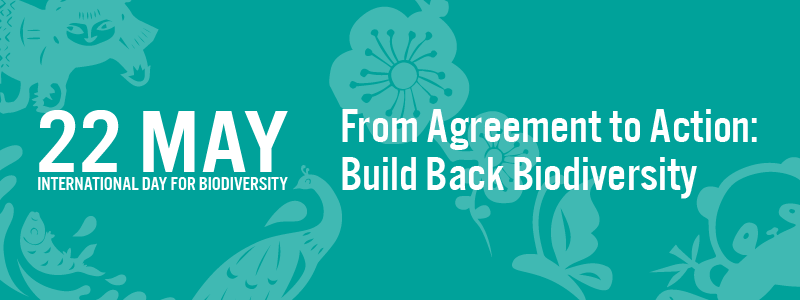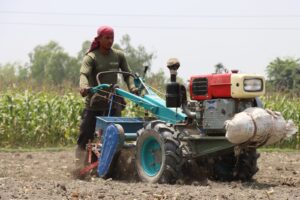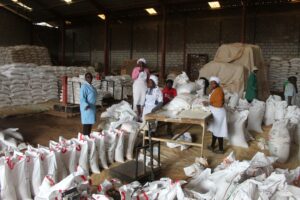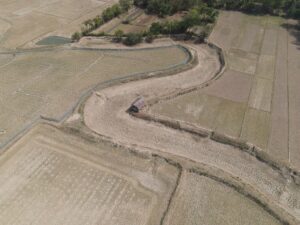
Biological diversity is undoubtedly a global asset of tremendous value to future generations. Yet, certain human activities are leading to the deterioration and significant reduction in the number of many species.
To increase understanding and awareness of biodiversity issues, International Biodiversity Day is celebrated annually on 22 May. This year’s theme, From agreement to action: Build back biodiversity, focuses on finding tangible solutions to the challenges related to the restoration and protection of biodiversity.
Commemorating the day, the International Rice Research Institute (IRRI) is committed to practices offering sustainable and resilient approaches to agriculture such as organic farming practices. Organic farming practices address a number of challenges related to biodiversity conservation including:
Organic farming practices and biodiversity conservation
Organic farming distinguishes itself by prohibiting synthetic pesticides, herbicides, and fertilizers to reduce the risk of environmental contamination and fosters biodiversity. By relying on natural and organic inputs, organic farmers prioritize the preservation of ecosystems. This approach promotes healthier soils, water sources, and habitats, allowing diverse flora and fauna to thrive.
Promoting ecological balance
Organic farming practices prioritize preserving ecological balance by embracing natural cycles and minimizing ecosystem disruptions. By avoiding synthetic chemicals, organic farmers protect beneficial organisms such as pollinators, birds, and soil organisms that play vital roles in agricultural productivity. For instance, pollinators are crucial for the reproduction of many crop species, contributing to their genetic diversity and enhancing food security.
Protection of wildlife habitats
Organic farming recognizes the significance of wildlife habitats and strives to preserve and create suitable environments for various species. IRRI South Asia Research Centre (ISARC) and other organizations have been at the forefront of ecological engineering, creating habitats that attract beneficial insects, birds, and other wildlife.
The bird perches strategically placed in organic fields provide perching and hunting spots for birds, reducing pest populations naturally without chemical interventions.
The importance of biodiversity in sustainable agriculture
Biodiversity serves as the foundation for sustainable agriculture, contributing to the health and resilience of agricultural systems. Different crop varieties provide genetic resources to withstand pests, diseases, and changing environmental conditions. They enhance resilience by reducing the risk of crop failure and fostering adaptation to evolving challenges, such as climate change.
Pollinators and natural pest control
Biodiversity, particularly pollinators such as bees, butterflies, and birds, plays a pivotal role in reproducing many flowering plants and crops. Pollinators facilitate cross-pollination, leading to improved crop yields and quality. Additionally, diverse ecosystems support natural pest control mechanisms, such as the presence of predatory insects and birds, which regulate pest populations and reduce the need for chemical pesticides.
Conservation agriculture and biodiversity conservation
Conservation agriculture practices, including minimal soil disturbance, crop diversification, and soil cover, contribute significantly to biodiversity conservation. Minimal soil disturbance reduces erosion and protects beneficial soil organisms, enhancing soil health and fertility. Crop diversification minimizes the risk of crop failure and provides habitats for a wide range of species. Soil cover through cover crops and mulching protects soil structure, promotes water retention, and supports diverse soil microorganisms critical for nutrient cycling.
Organizations like IRRI are playing a crucial role in advancing organic farming practices, zero tillage, ecological engineering, bund crops for pest control and pollinators, bio-fertilizers, and bird perches. By embracing these practices and valuing biodiversity, we can cultivate a healthier and more sustainable future for ecosystems and agriculture.
ISARC promotes sustainable agricultural practices that prioritize soil health and biodiversity. Zero tillage, a technique advocated by ISARC, minimizes soil disturbance and preserves its structure and organic matter. This approach creates a favorable environment for beneficial soil organisms such as bacteria, fungi, earthworms, and insects and contributes to nutrient cycling, soil aeration, and disease suppression.
Alongside zero tillage, ISARC also focuses on ecological engineering, incorporating hedgerows, wildflower strips, and diverse crop rotations to enhance biodiversity and ecosystem services. These practices attract pollinators, natural predators, and other beneficial organisms, reducing the reliance on chemical pesticides and supporting crop pollination while regulating pest populations.
Bund crops, an innovative technique promoted by ISARC, involve intercropping or planting specific crops as borders around fields. This method acts as a natural barrier against pests and diseases, providing habitat and food for beneficial insects and birds and contributing to pest control and biodiversity conservation.
ISARC’s research on bio-fertilizers offers sustainable alternatives to synthetic fertilizers, utilizing beneficial microorganisms to improve soil fertility naturally and minimize environmental pollution.
Finally, ISARC encourages the strategic placement of bird perches throughout organic fields to attract predatory species and create a natural balance within the ecosystem. This approach reduces the need for chemical pesticides and fosters a healthier and more resilient agricultural system.
As we commemorate International Biodiversity Day, let us recognize the invaluable contribution of organic farming practices to biodiversity conservation in our agricultural landscapes. By embracing organic agriculture and supporting initiatives, we can cultivate a sustainable future where agriculture thrives in harmony with nature. Together, let us champion biodiversity conservation and work towards a resilient, productive, and environmentally responsible agricultural system.






